

Waiting for Godot. Plot[edit] Act I[edit] Estragon soon dozes off, but, after rousing him, Vladimir is not interested in hearing about Estragon's dreams—another recurring motif.
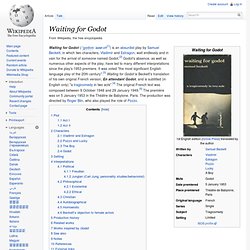
Estragon wants to hear an old joke, which Vladimir starts but cannot finish, as he is urgently compelled to rush off and urinate due to a kidney ailment that pains him whenever he laughs. Estragon next suggests that they hang themselves, but they abandon the idea when their strategy seems infeasible. The Wild Party by Joseph Moncure March - Reviews, Discussion, Bookclubs, Lists. Vladimir Nabokov. Vladimir Vladimirovich Nabokov (Russian: Влади́мир Влади́мирович Набо́ков, pronounced [vlɐˈdʲimʲɪr nɐˈbokəf] ( ), also known by the pen name Vladimir Sirin; 22 April [O.S. 10 April] 1899c – 2 July 1977) was a Russian-American novelist.[1] Nabokov's first nine novels were in Russian.
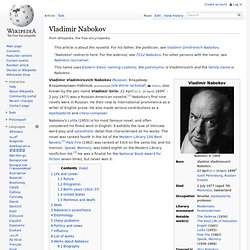
He then rose to international prominence as a writer of English prose. He also made serious contributions as a lepidopterist and chess composer. Nabokov's Lolita (1955) is his most famous novel, and often considered his finest work in English. It exhibits the love of intricate word play and synesthetic detail that characterised all his works. Pale Fire. Pale Fire (1962) is a postmodern novel by Vladimir Nabokov.
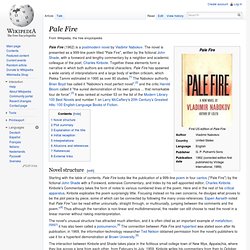
The novel is presented as a 999-line poem titled "Pale Fire", written by the fictional John Shade, with a foreword and lengthy commentary by a neighbor and academic colleague of the poet, Charles Kinbote. Together these elements form a narrative in which both authors are central characters. Pale Fire has spawned a wide variety of interpretations and a large body of written criticism, which Pekka Tammi estimated in 1995 as over 80 studies.[1] The Nabokov authority Brian Boyd has called it "Nabokov's most perfect novel",[2] and the critic Harold Bloom called it "the surest demonstration of his own genius ... that remarkable tour de force".[3] It was ranked at number 53 on the list of the Modern Library 100 Best Novels and number 1 on Larry McCaffery's 20th Century’s Greatest Hits: 100 English-Language Books of Fiction. Novel structure[edit] English Language. Charles Bukowski. Life and work[edit] Family and early years[edit] Charles Bukowski was born as Heinrich Karl Bukowski in Andernach, Germany, to Heinrich (Henry) Bukowski and Katharina (née Fett).
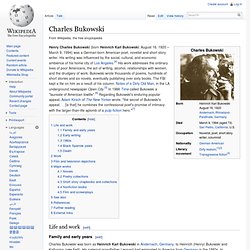
His paternal grandfather Leonard had emigrated to America from Germany in the 1880s. In Cleveland, Leonard met Emilie Krause, who had emigrated from Danzig, Germany (today Gdańsk, northern Poland). They married and settled in Pasadena. Women (novel) Women focuses on the many dissatisfactions Chinaski faced with each new woman he encountered.
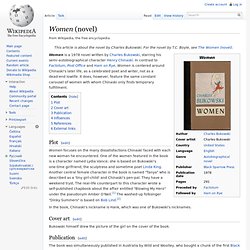
One of the women featured in the book is a character named Lydia Vance; she is based on Bukowski's one-time girlfriend, the sculptress and sometime poet Linda King. Another central female character in the book is named "Tanya" who is described as a 'tiny girl-child' and Chinaski's pen-pal. They have a weekend tryst. The real-life counterpart to this character wrote a self-published chapbook about the affair entitled "Blowing My Hero" under the pseudonym Amber O'Neil.[1] The washed-up folksinger "Dinky Summers" is based on Bob Lind.[2] James Joyce. Joyce was born into a middle class family in Dublin, where he excelled as a student at the Jesuit schools Clongowes and Belvedere, then at University College Dublin.
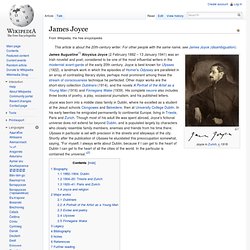
Ulysses (novel) Ulysses is a modernist novel by Irish writer James Joyce. It was first serialised in parts in the American journal The Little Review from March 1918 to December 1920, and then published in its entirety by Sylvia Beach in February 1922, in Paris. It is considered to be one of the most important works of Modernist literature,[1] and has been called "a demonstration and summation of the entire movement".[2] "Before Joyce, no writer of fiction had so foregrounded the process of thinking. Samuel Beckett. Samuel Barclay Beckett (/ˈbɛkɪt/; 13 April 1906 – 22 December 1989) was an Irish avant-garde novelist, playwright, theatre director, and poet, who lived in Paris for most of his adult life and wrote in both English and French.
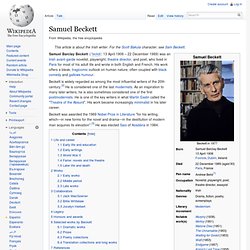
His work offers a bleak, tragicomic outlook on human nature, often coupled with black comedy and gallows humour. Beckett is widely regarded as among the most influential writers of the 20th century.[2] He is considered one of the last modernists. As an inspiration to many later writers, he is also sometimes considered one of the first postmodernists. He is one of the key writers in what Martin Esslin called the "Theatre of the Absurd".
Albert Camus. Albert Camus (French: [albɛʁ kamy] ( Camus did not consider himself to be an existentialist despite usually being classified as one, even during his own lifetime.[1] In an interview in 1945, Camus rejected any ideological associations: "No, I am not an existentialist.
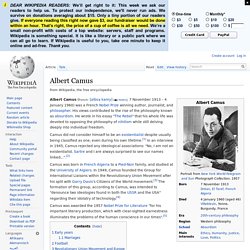
Sartre and I are always surprised to see our names linked... ".[2] The Stranger (novel) The Outsider or The Stranger (French: L’Étranger) is a novel by Albert Camus published in 1942.
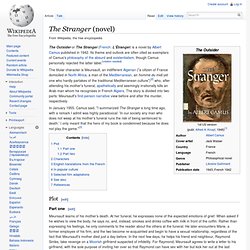
Its theme and outlook are often cited as exemplars of Camus's philosophy of the absurd and existentialism, though Camus personally rejected the latter label. [citation needed] The titular character is Meursault, an indifferent Algerian ("a citizen of France domiciled in North Africa, a man of the Mediterranean, an homme du midi yet one who hardly partakes of the traditional Mediterranean culture")[2] who, after attending his mother's funeral, apathetically and seemingly irrationally kills an Arab man whom he recognises in French Algiers. The story is divided into two parts: Meursault's first-person narrative view before and after the murder, respectively. The Fall (Albert Camus novel) The Fall (French: La Chute) is a philosophical novel written by Albert Camus.
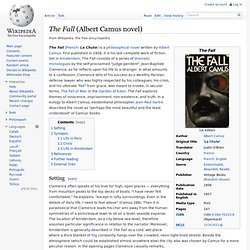
First published in 1956, it is his last complete work of fiction. Set in Amsterdam, The Fall consists of a series of dramatic monologues by the self-proclaimed "judge-penitent", Jean-Baptiste Clamence, as he reflects upon his life to a stranger. In what amounts to a confession, Clamence tells of his success as a wealthy Parisian defense lawyer who was highly respected by his colleagues; his crisis, and his ultimate "fall" from grace, was meant to invoke, in secular terms, The Fall of Man in the Garden of Eden.
The Fall explores themes of innocence, imprisonment, non-existence, and truth. Madame Bovary. Madame Bovary (1856) is the French writer Gustave Flaubert's debut novel. The story focuses on a doctor's wife, Emma Bovary, who has adulterous affairs and lives beyond her means in order to escape the banalities and emptiness of provincial life. Though the basic plot is rather simple, even archetypal, the novel's true art lies in its details and hidden patterns. Flaubert was a notorious perfectionist and claimed always to be searching for le mot juste ("the precise word"). In Search of Lost Time. The novel began to take shape in 1909.
Proust continued to work on it until his final illness in the autumn of 1922 forced him to break off. Proust established the structure early on, but even after volumes were initially finished he kept adding new material and edited one volume after another for publication. Haruki Murakami. Japanese writer Haruki Murakami (村上 春樹, Murakami Haruki, born January 12, 1949) is a Japanese writer. His books and stories have been bestsellers in Japan as well as internationally, with his work being translated into 50 languages[1] and selling millions of copies outside his native country.[2][3] His work has received numerous awards, including the World Fantasy Award, the Frank O'Connor International Short Story Award, the Franz Kafka Prize, and the Jerusalem Prize.[4][5][6] Biography[edit] Murakami was born in Kyoto, Japan, during the post-World War II baby boom and raised in Shukugawa (Nishinomiya), Ashiya and Kobe.[11][12] He is an only child.
His father was the son of a Buddhist priest,[13] and his mother is the daughter of an Osaka merchant.[14] Both taught Japanese literature.[15] The Wind-Up Bird Chronicle. The Wind-Up Bird Chronicle (ねじまき鳥クロニクル, Nejimakidori Kuronikuru?) Is a novel published in 1994–1995 by Japanese author Haruki Murakami. The first published translation was by Alfred Birnbaum. The American translation and its British adaptation, dubbed the "only official translations" (English) are by Jay Rubin and were first published in 1997. Hard-Boiled Wonderland and the End of the World. Hard-Boiled Wonderland and the End of the World (世界の終りとハードボイルド・ワンダーランド, Sekai no owari to Hādo-Boirudo Wandārando = Sekai no owari & Hard-Boiled Wonderland?) Is a 1985 novel by Japanese writer Haruki Murakami. The English translation by Alfred Birnbaum was released in 1991.
Ryūnosuke Akutagawa. Franz Kafka.